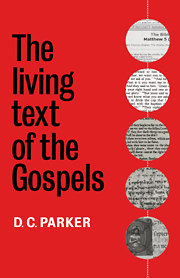Book contents
- Frontmatter
- Contents
- Preface
- List of abbreviations and frequently cited works
- 1 The theory
- 2 The materials
- 3 The practice
- 4 ‘As our Saviour taught us …’: the Lord's Prayer
- 5 The sayings on marriage and divorce
- 6 The story of the woman taken in adultery
- 7 Secrets and hypotheses
- 8 The endings of Mark's Gospel
- 9 The last three chapters of Luke
- 10 The development and transmission of the Fourth Gospel
- 11 From codex to disk
- 12 The living text
- Index of citations
- Index of Greek New Testament manuscripts
- Index of names and subjects
10 - The development and transmission of the Fourth Gospel
Published online by Cambridge University Press: 05 June 2012
- Frontmatter
- Contents
- Preface
- List of abbreviations and frequently cited works
- 1 The theory
- 2 The materials
- 3 The practice
- 4 ‘As our Saviour taught us …’: the Lord's Prayer
- 5 The sayings on marriage and divorce
- 6 The story of the woman taken in adultery
- 7 Secrets and hypotheses
- 8 The endings of Mark's Gospel
- 9 The last three chapters of Luke
- 10 The development and transmission of the Fourth Gospel
- 11 From codex to disk
- 12 The living text
- Index of citations
- Index of Greek New Testament manuscripts
- Index of names and subjects
Summary
Like – but oh, how different!
William Wordsworth, ‘Yes, it was the mountain Echo’Almost all the material examined so far has been found in the Synoptic Gospels. Only the spurious story of the woman taken in adultery, whose presence in the Fourth Gospel is almost accidental, has led us into its pages. This chapter will do little to redress the balance, for its purpose is not to introduce variants but to discuss a methodological question which demands our attention. Many of the most important variants in the Fourth Gospel are small changes of vital theological significance, such as the variant ‘only God’ or ‘only Son’ at 1.18. None of these will be discussed. Instead, one longer passage of little theological significance will serve as a prologue to the main question.
The story of the angel at the pool is, after the story of the adulterous woman, the most significant legendary accretion on whose inclusion the manuscripts differ. The RSV at 5.3 reads
In these lay a multitude of invalids, blind, lame, paralyzed.
To this Ac C3 D Ws Φ Ψ 063 078 fam1 fam13 and most later manuscripts, with the Latin, Peshitta and Harklean Syriac versions and some Bohairic witnesses, add (the square brackets indicate words omitted in one or more of these witnesses) waiting for the moving of the water. For an angel [of the Lord] went down [at certain seasons] [into the pool], and troubled the water: whoever stepped in first [after the troubling of the water] was healed of whatever disease he had.
- Type
- Chapter
- Information
- The Living Text of the Gospels , pp. 175 - 181Publisher: Cambridge University PressPrint publication year: 1997



